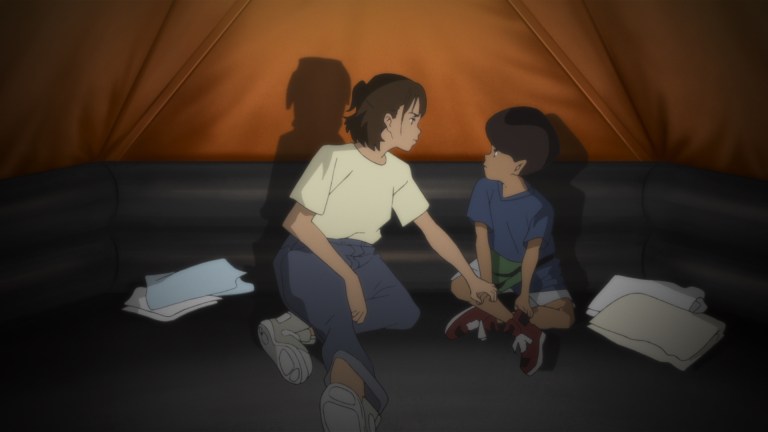Japan Sinks: 2020 Review (Spoiler-Free)
Animation visionary Masaaki Yuasa’s epic disaster series Japan Sinks: 2020 tells a powerful story that connects on both a universal and personal level.

This review is based on all ten half-hour episodes of Japan Sinks: 2020’s first season and contains no spoilers.
“Fingers crossed.”
Oddly enough, people seem to love the idea of the end of the world. Perhaps there’s comfort to be found in the escape to some alternate apocalypse scenario when the real world feels like it’s spinning off its axis. There’s been a growing trend in apocalypse stories where plucky survivors have to band together, form a family, and survive, whether it’s in movies, anime, or video games. Japan Sinks: 2020 strives to be different by its use of shifting perspectives and the amount of ground that it covers.
Japan Sinks: 2020 comes courtesy of the brilliant Masaaki Yuasa, who is easily one of the most exciting names in animation right now. Yuasa consistently reinvents genres and what animation can handle, so him heading into a mature apocalypse drama is incredibly exciting and broaches new territory, both thematically and in a narrative sense for the visionary director. The result is one of the most thought-provoking and accomplished anime of the year.
Based on the novel by Sakyo Komatsu, Japan Sinks: 2020 paints a vivid picture of a nation in danger as the very ground it stands on begins to give out. The series brilliantly takes its time to slowly show how the first signs of this disaster uniquely affect people all over Japan. It’s a comfortable, leisurely pace that’s allowed due to the fact that this is a series and not a film. It’s easy to see why Yuasa was interested in this project for the medium of television. There’s genuine tension that grows out of everyone’s initial naivety to the disaster and how the grim reality of their situation gradually sinks in and infects everyone like a virus.
It’s also genuinely scary once people begin to finally feel the devastation of this incident. Yuasa’s told some fantastical stories in the past, but part of what makes Japan Sinks: 2020 so powerful is that it doesn’t feel that much removed from our reality. The concept hits eerily close to home and is one of the more successful and emotional disaster stories as a result. It almost feels like a work of Stephen King in terms of its scope and large cast. Japan Sinks: 2020 proves that there’s no monster more frightening than Earth itself and no force more powerful than the human spirit.
Japan Sinks: 2020 looks at this disaster on global level, but it narrows in on the Mutoh family, which consists of teenager Ayumu, her younger brother, and her mom and dad. There’s a moment early on in the series, but it becomes a recurring motif, where the Mutoh family wants to take a picture of themselves after the earthquakes begin to hit. The idea of commemorating this occasion is pointed out to be ludicrous, but it doesn’t matter to them since they’re all in it together. The framing of the photo only allows the perfection of the Mutoh family to get in and the terrible reality of the world is confined to beyond the frame.
At the same time, it’s fascinating to see stress fester within the Mutoh family and wear down on the members in contrasting ways as their group goes through various changes. The most beautiful episode of the whole series slows things down and allows Ayumu and her brother, Go, to really connect as siblings and reminisce over simpler times after everything that they’ve experienced. It’s brutal to see these bonds get frayed, but they’re all moments that are deeply honest and show the pains of grief. The series definitely speaks to the idea that beauty can be born from out of destruction.
Japan Sinks: 2020 ricochets between optimistic and traumatic, but also highlights how thin the line is between these two extremes. The series feels incredibly appropriate for these current times, even if it does have to wade through some depressing and heart-wrenching material to reach the brighter moments. In addition to the core family dynamic, the Mutohs pick up a roving number of people in their party as they continue to move across the broken country. These guests that come and go add both variety and suspense to the mix as the Mutoh family are put in difficult positions.
Japan Sinks: 2020 builds towards powerful emotional set pieces that rival some of the best moments from Yuasa’s previous works. The depth that he’s able to capture in a television series like this hopefully means that he’ll be able to do another Netflix collaboration soon to complete the “trilogy” that he started with this and Devilman Crybaby. Yuasa’s animation style typically skews more towards the extreme, but in Japan Sinks: 2020 he captures a stunning realism with the locations in Japan that he focuses on here. There are plenty of sequences that take the time to appreciate gorgeous sunrises and sunsets that take place over the world, pre- and post-disaster.
Yuasa is known for breaking convention and embracing the surreal, but it’s really effective to see these areas depicted in stunning glory before they’re then ruined through devastation. It helps the audience appreciate what gets lost on a level that’s deeper than purely the story beats and the sensational premise. While Japan Sinks: 2020 is definitely one of Yuasa’s more restrained works in terms of the art style, there are still tiny bursts of flair where it’s appropriate, like how the story occasionally gains the aesthetic of a video game when Go’s imagination gets the better of him.
Japan Sinks: 2020 doesn’t forget that it’s a disaster series. There are many moments that feel like they’re from straight out of a horror series as the threats begin to grow and become more intense. It’s like a domino effect of disasters or some kind of Biblical curse. Right after everyone is grateful to survive a disaster, the environmental causal effects of it will trigger another accident that they then need to endure. It truly speaks to how terrifying it is that the planet is so fragile in many ways.
There’s a surprising turn that’s taken in the second episode that literally took my breath away and shows that this series isn’t messing around. These gut punch surprises soon become regular experiences in each episode. Much like how disasters can strike randomly and without warning in real life, Japan Sinks: 2020 hits hard and when it’s least expected, which gives the series a terrifying bite. There are times when humanity plummets and embraces its darker instincts, which are just as scary as the natural disaster at hand. Japan is sinking, but maybe it deserves to be.
Japan Sinks: 2020 is a thoroughly enjoyable journey that’s’ satisfying in the way that the best disaster stories are, but also features so many creative examples of connection and family. It finds ways to use things like freestyle rap or Morse code as cathartic tools and it arrives at an ending that it’s hard to not be moved by. Japan Sinks: 2020 is not Yuasa’s best work, but it feels like an incredibly appropriate project to come out at the moment. It’s full of heart and innovation, plus it tackles many questions that are on the public’s mind right now.
Japan Sinks: 2020 is available to stream on Netflix now.

